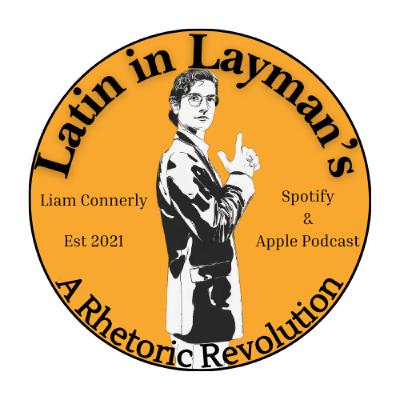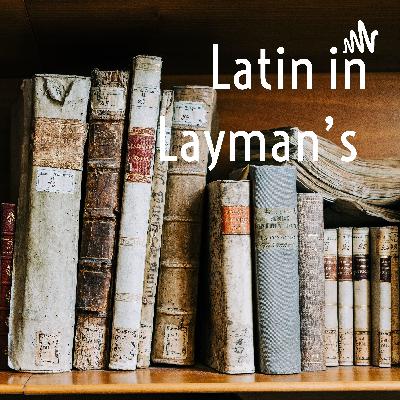Discover Latin in Layman’s - A Rhetoric Revolution
Latin in Layman’s - A Rhetoric Revolution

Latin in Layman’s - A Rhetoric Revolution
Author: Liam Connerly
Subscribed: 48Played: 1,212Subscribe
Share
© Liam Connerly
Description
Latin in Layman’s gives you the ability to understand and command language in a whole new respect. Join a typical grammarian and classicist as I expand your vocabulary, understanding of grammar, Etymology, terminology (i.e. legal, medical, botanical, etc.), and so much more. I also utilize this platform to expand on greater thoughts of mine, as well as discussing the importance of language and the promotion of "The Language Revival" (as I like to call it...) Thank you for your interested in knowledge, language acquisition, the command of one's own language, and the understanding of the world.
350 Episodes
Reverse
This is a doozy of a lesson so I’ve split it up into two parts. The subjunctive is what is known to be the mood of uncertainty… but more often than not, it simply introduces specific types of clauses and/or subordinating constructions. This is when Latin translation becomes more fluid and contextual rather than clunky and fragmented Wheelock’s sentences (Don’t @ me Wheelock.) Anyways, very important grammar to learn as well as linguistics and the evolution of our Proto-Indo-European Mother tongue into what we now know as all the daughter languages of the world.
Here, I go over a key important concept within both English and Latin grammar. This is the introduction into another subordinate construction (Like Ablative Absolutes) that indirectly and circuitously state a direct quote, action, thought, etc. Stay tuned for knowledge!
Here we go over the constructions of the ablative absolute and the passive periphrastic. Definitely ten-dollar terms for explaining how to make a sentence more convoluted and circuitous. Stick with me!! We’re switching into syntactical Latin and leaving behind its rudimentary formation counterpart! This is when it gets good and when we’ll start to incorporate Harry Potter in Latin!
Here we have a VERY important lesson and one of my very favorite topics in Latin! (Don’t ask me why, I think it’s cause I got it the first time I read what they were…) I have always thought of these constructions as verbial adjectives. Not sure if I can coin that or not… Remember, as we go through this lesson, there is no such thing as a present passive participle or a perfect active particle! That means you only have four forms to memorize here instead of six!!! Yayayaya(ya)!
Short and sweet one again! Here we go over our last declension in Latin!!! Yayayayaya!!!… Don’t get too excited, we still have lots o’ chapters and concepts to cover!
Short lil’ episode going over some irregularities and things to note in the passive system. Nothing new here though! Kick back and reeeelllaaaxxx.
Here we go over the very distinctive -u- stem declension. We go over both the grammar and a little linguistic history to add a lol’ cherry on top. Nice a short episode for y’all that have a short attention span… aka the majority pop.
Here I go over the formation, literal translation, and functions of the perfect passive system in all of its forms: present prefect passive, pluperfect passive, future perfect passive… I recommend to do a little refresher of the present passive system in order to remember just how we form passive verbs and what type of agents (Not Direct Objects!!!!) they expect.
More pronoun stuff and understanding some basic fundamentals in grammar as we tackle what clauses are, subordinating clauses, antecedents, and just why the heck they’re so important to our understanding of language and sentence structure! I’M NOT BORING I PROMISE.
Here I go over the concept of the third declension I-Stem nouns and the three ablative forms that accompany it. Lots of grammar in this, but a very important and rather easy concept!
Here I go over a wide array of concepts and linguistic markers in order to understand pronouns in their entirety as they function in both Latin and English - where they both compliment and contrast one another. I go on a small tangent about Porto-Indo-European linguistic characters and how they’ve been passed through language. I want to thank my professor Dr. Mark Damen for giving me a deeper knowledge of language other than simply translating and memorizing but truly understanding how objective grammarians are!
Here we go over MORE pronouns and understand the distinctions between the various forms we’ve learned thus far… A thing to note: reflexives reflect the subject and intensives intensify an action. This one is fun!!!
I love this tense. Here, we dive into understanding and conjugating the perfect tense, pluperfect (the even more perfect tense!), and the future perfect tense. You’re slowly becoming a master at your craft and I show you just that to close out the episode.
Here we go over the fourth and fifth conjugation verb forms… Known as the third-io because it shares more forms with the third but doesn’t surpass the form of the fourth. All tense are covered as well
Here I dive into demonstrative pronouns for our first of many pronoun lessons. I give a basis of understanding and memorizing irregularities as well as give you a history/etymological lesson!
Here we go over my least favorite conjugation… *sigh*… but at least the imperfect doesn’t have irregularities! Plus, it gives us more Latin vocabulary to draw from.
Here we dive into our “catch-all” declension, as I like to call it. With being given a new declension (Yes, I speak in passive voice sometime, don’t @ me), we are essentially given a whole new set of vocabulary. There is both bonus et malus news with this chapter
Here I dissect the future and imperfect tenses and help us understand how the imperfect is NOT simple past! I also ramble a bit and ask for y’all for ideas on future episodes! Thanks for the support and will definitely consider knitting you a sweater if you leave me 5 stars on Apple Podcasts!
Here I go over three concepts! The neuter declension, which strongly mirrors the masculine in formation, substantives (of which I bet y’all have never heard of although you use on a daily basis), and the most important irregular intransitive verb you’ll come across — “I am.”
---
Support this podcast: https://anchor.fm/liam-connerly/support
Here we go over Latin’s second declension, which outlines the basis of the masculine gender. We go over each case and irregular bases, as well as touching on the vocative in the end.
---
Support this podcast: https://anchor.fm/liam-connerly/support






